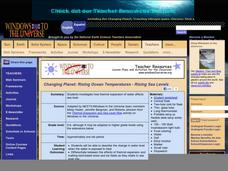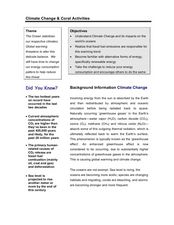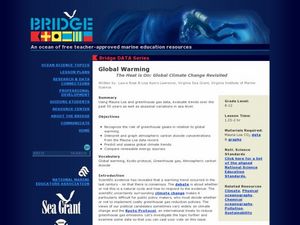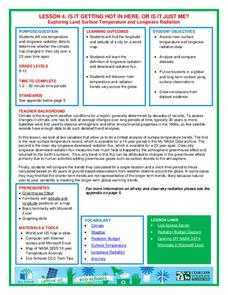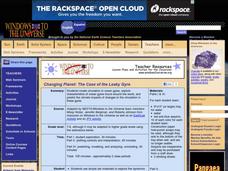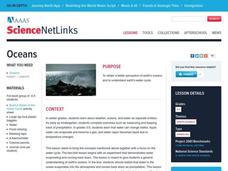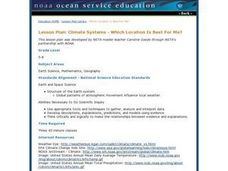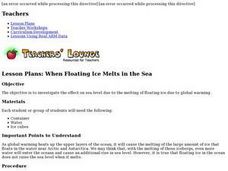McAuliffe-Shepard Discovery Center
Global Warming in a Jar
This well-organized lab activity introduces earth science pupils to the greenhouse effect. They will set up two experiments to monitor temperatures in an open jar, a closed jar, and a closed jar containing water. Ideally, you would have...
Curated OER
Changing Planet: Rising Ocean Temperatures - Rising Sea Levels
As an anticipatory set, young environmental technicians watch a video about how ocean temperatures seem to be changing along with the global climate. They perform a laboratory demonstration with the purpose of observing what happens to...
Curated OER
Climate Change & Coral Activities
Students study how the ocean stabilizes our planet's climates and how global warming is becoming a threat to this fine balance. In this climate change lesson, students identify that fossil fuel emissions are responsible for...
Curated OER
Climate Change: Is there a Controversy
Students explore climate changes. In this climate changes instructional activity, students research what causes changes. Students search the Internet, summarize reports they find and create a poster with the information.
Curated OER
Water Cycle, Weather, and Climate
Eighth graders investigate the water cycle and its processes. They examine temperature and precipiation data to classify climate of ten cities. They then create a climate map of the world.
California Academy of Science
Climate Change Impacts
Getting kids thinking about climate change now, will hopefully push them into action when they become adults. Young environmentalists discuss the evidence and causes of climate change seen in the state of California. They brainstorm ways...
Curated OER
Global Warming - The Heat is On: Global Climate Change Revisited
After listening to your lecture on climate change, young scientists access NOAA's database listing Mauna Loa's carbon dioxide data. They graph the monthly means and then compare their graphs to NOAA's. This is a concise plan that could...
National Wildlife Federation
Is It Getting Hot in Here, or Is It Just Me?
Currently, only 2.1% of global warming is felt on continents, while over 93% is felt in the oceans. The fourth lesson in the series of 21 on global warming is composed of three activities that build off one another. In the first...
National Wildlife Federation
The Tide is High, but I’m Holding On… Using ICESat Data to Investigate Sea Level Rise
Based on the rate of melting observed from 2003-2007 in Greenland, it would take less than 10 minutes to fill the Dallas Cowboys' Stadium. The 17th lesson in a series of 21 has scholars use the ICESat data to understand the ice mass...
Curated OER
Changing Planet: The Case of the Leaky Gyre
The fascinating video "Changing Planet: Fresh Water in the Arctic," introduces your oceanographers to the world's gyres. They learn that melting sea ice is making the gyres larger, and that the changes could, in turn, contribute even...
Wild BC
Carbon Sinks and Sources
Earth or environmental science pupils are assigned to be carbon sources or sinks. They ask yes-or-no questions to try to figure out which one they are. Then they discuss ways people can have positive effects on the changing climate by...
Curated OER
Changing Planet: Fading Corals
Show the six-minute video, "Changing Planet: Fading Corals," and then demonstrate how calcium carbonate forms a precipitate in the presence of carbon dioxide. Separate your scientists into small groups to gather information about coral...
Consortium for Ocean Science Exploration and Engagement (COSEE)
One Ocean: It Matters!
Here is the first of four poignant lessons on how humans and oceans interact, even if people live far from the coast. This particular lesson also examines studies that are taking place in Antarctica of how climate change is affecting the...
California Academy of Science
Tropical Belt
Where in the world is the equator? Explore a world map with your class, coloring in oceans, continents, and rainforests while locating the three major lines of latitude: the equator, Tropic of Cancer, and Tropic of Capricorn. Discuss how...
Curated OER
Oceans
Students use their prior knowledge to being their examination of the water cycle. In groups, they complete an experiment in which they can see water evaporating and coming back to the ground. They discover the ocean's water evaporates...
Curated OER
Climate Change: Carbon Cycle
Students explore the carbon cycle. In this carbon cycle instructional activity, students discuss the four main reservoirs where carbon is stored and then discover the process through which each reservoir absorbs and releases CO2. This...
Curated OER
Oceans of the World
Students compare and contrast information about oceans. They locate the oceans on a globe, and in small groups conduct Internet research on the oceans, identifying the similarities and differences and writing a report.
Curated OER
Climate Systems - Which Location Is Best For Me?
Students study the difference between weather and climate. In this climate systems lesson plan students search the Internet for the parts of the Earth's system, gather climate data and complete a challenge scenario.
Curated OER
PLATE MOVEMENTS AND CLIMATE CHANGE
Students label three geological maps with continents provided to analyze the relationships between the movement of tectonic plates and the changes in the climate. In small groups, they discuss their findings and form hypotheses about the...
Curated OER
Understanding Climate
Fourth graders create two dioramas out of household materials to compare the influence of various factors that impact climate. Each group discuss how the change in factors influenced the climate, flora, and fauna of their area.
Curated OER
When Floating Ice Melts in the Sea
With this simple inquiry exercise young scientists observe the effects of melting ice on water level. Set up an easy experiment with floating ice cubes in a dish of water then have your pupils make and record their observations of the...
NOAA
Off Base
How does carbon dioxide affect the world's oceans? The final installment in a series of six lessons has pupils research ocean acidification, then conduct an experiment to witness the delicate balance that exists in our seas. Materials...
Florida International University
The Good, the Bad and the Nasty Tasting
Examine the benefits of chemical defense mechanisms. Organisms in oceans use chemicals to ward off predators. Duplicate this adaptation using a hands-on experiment in which you ward off your predators (your pupils) with some...
Curated OER
The Future of Arctic Sea Ice
Students research about the importance of sea ice to world climate and sea organisms. In this earth science lesson, students create a model of present and future Arctic sea ice communities. They discuss how ice melting affects...

